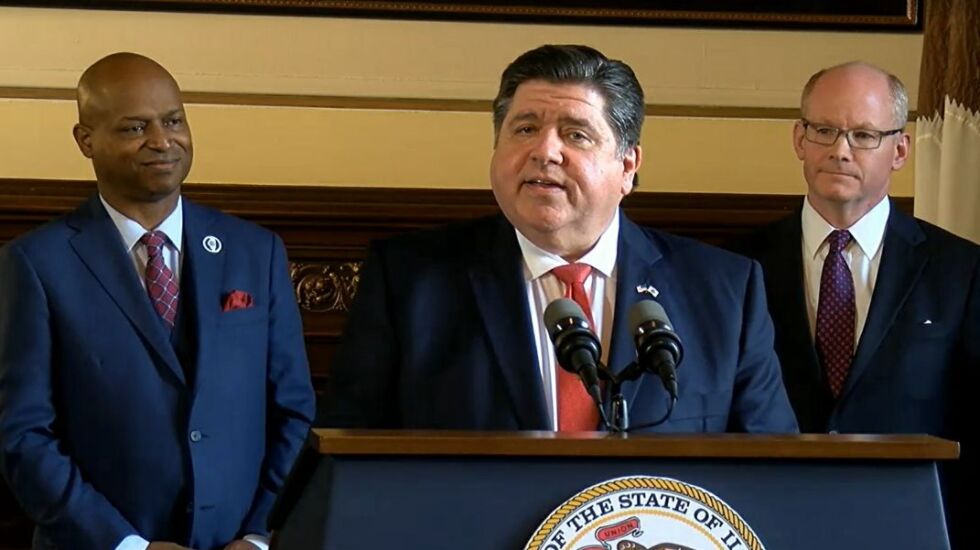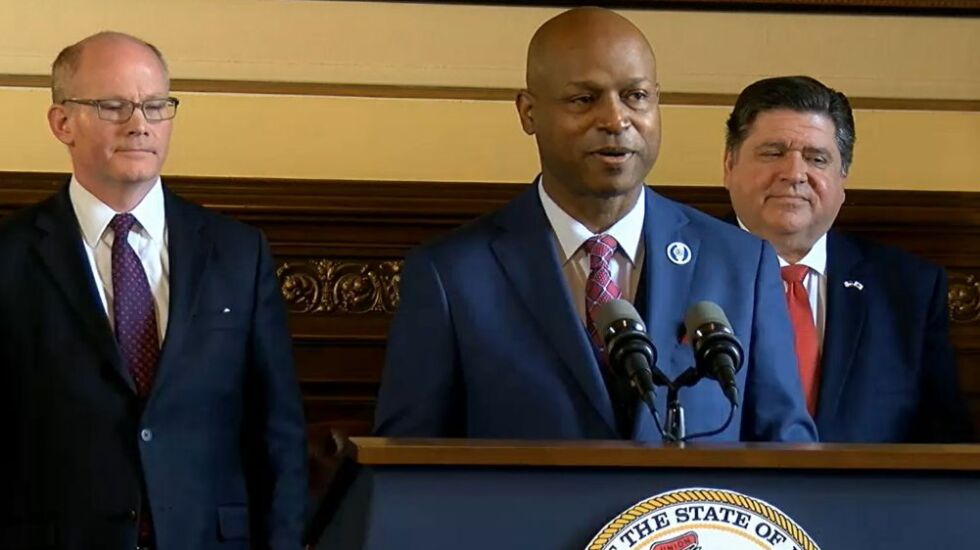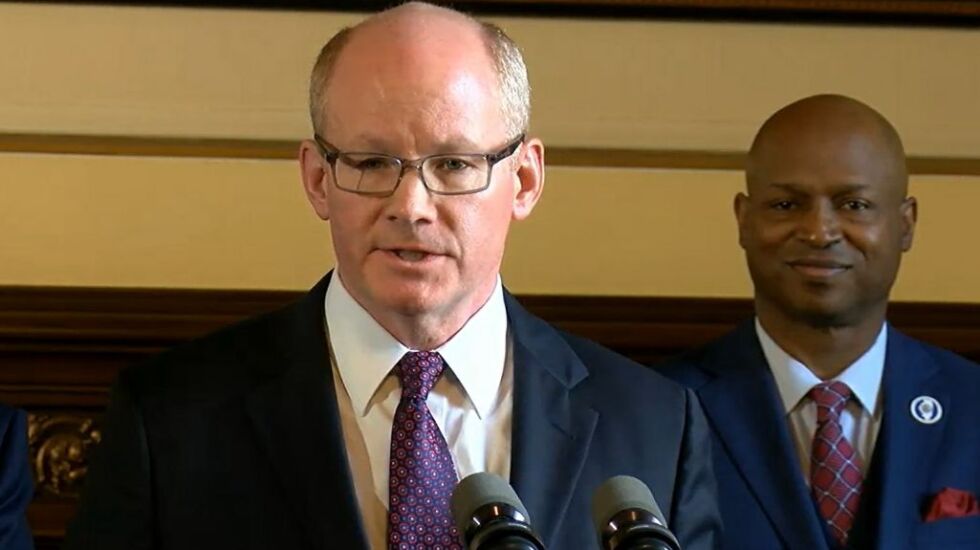
Democrats finally filed a state budget bill Wednesday night — five days after blowing a self-imposed deadline and nearly six hours after Gov. J.B. Pritzker and party leaders held a celebratory news conference to declare they had reached agreement on a “good” and “balanced” budget.
But even after the afternoon victory lap, a bit of nervousness hung in the air, at least for onlookers, as the actual piece of legislation — all 3,409 pages of it — slowly surfaced.
And by Wednesday night, the Illinois Senate adjourned without taking it up, as Illinois Senate President Don Harmon acknowledged there was a “mechanical impossibility” for them to pass the legislation in time for the House to read it into the record on Wednesday, a step that must come before that chamber can vote on it.
Last week, Democratic leaders failed to meet their Friday deadline to pass an Illinois budget — so on Wednesday further delays seemed inevitable. Lawmakers had to file the measure by Wednesday night in order to give it time to clear both chambers by Friday, their new self-imposed target date. But the measure is still under review — and changes are possible, which now stretches budget voting into the weekend and perhaps beyond.
“The Senate filed a budget so that everyone involved could review it to make sure that it reflects the agreement,” John Patterson, spokesman for Harmon said.
The daytime back patting came easier than the actual nighttime bill filing.
“This is not just a balanced budget, it’s a good budget,” Pritzker told reporters on Wednesday afternoon alongside Harmon, D-Oak Park, and Illinois House Speaker Emanuel “Chris” Welch, D-Hillside,
Welch’s office on Wednesday night said they were confident they had the votes and planned to further discuss the measures during a House Democratic caucus.
But some lingering issues appeared still at play, suggesting possible tinkering or other efforts to lock up votes. Those include health care funding for undocumented persons, a program to help fund private school scholarships, evidence-based school funding and money for district projects, according to a source with direct knowledge of the negotiations.
Pritzker’s office on Wednesday afternoon released a fact sheet with highlights of the overall budget, but not the total spending amount. The governor said the budget is “mid-50-plus billion dollars” — which he described as “just a little bit more than the introduced budget.” Pritzker’s proposed budget plan from February totaled $49.6 billion in spending.
The spending plan is estimated to be $50.5 billion, according to a source close to negotiations.
“This budget is balanced — without gimmicks,” Welch said at the news conference. “This budget will help save for our future.”
Health care for undocumented immigrants was among the sticking points during budget negotiations last week. Democrats were wary of setting a number — and of taking the political responsibility for the budgetary ask. The cost to the state for health care coverage for undocumented people could cost more than $1 billion. But there has been contention over whether that figure is inflated.

Pritzker said the House and Senate have agreed to give the governor’s office the “tools” to manage the program so that it doesn’t reach an unsustainable proportion.
“We’re continuing the program going forward, but in a budget friendly way so that everybody gets the health care that they need,” Pritzker said.
According to the fact sheet provided by the governor’s office, the budget framework includes a $200 million additional pension payment, bringing total pension stabilization investments to $700 million.
It also includes adding $250 million to fund the first year of the governor’s early childhood plan to eliminate preschool deserts and help stabilize the childcare workforce. It also includes $50 million for early childhood capital improvements — and $350 million for the state’s evidence based funding formula for K-12 schools.
It does not include funding for Invest in Kids, a tax credit program for private school scholarships, that is largely supported by Republicans. The governor acknowledged, “this is something that still has time, potentially, but it’s not something that’s in the budget agreement.”
For higher education, the proposal includes $100 million in additional MAP grant funding and a $100 million increase for public universities.
For economic development, $400 million would go towards closing major economic development deals and attracting businesses and jobs to the state.
It also includes continued funding for the $250 million Reimagine Public Safety Act to prevent gun violence and expand funding for youth employment programs — and an $18 million increase to support reproductive health initiatives, according to the governor’s office.
Democratic leaders said they wanted a more seamless budget plan this year — one in which the Senate would not introduce the measure until it is fully agreed upon with the House. Typically there are amendments — and disagreements — during the process as legislative caucuses try to ensure the framework includes their needs.
The budget filed on Wednesday must still pass both chambers, but Welch and Harmon said they expected it to do so, and Pritzker vowed to sign it.
Last week’s Friday deadline was artificial, not required by any state law or legislative rules. But stretching the process much beyond that would show that Democrats, even with a supermajority in both chambers, couldn’t get their act together. On May 31, bills effective immediately require a three-fifths majority. The new fiscal year begins on July 1.
Wednesday afternoon, Harmon dismissed any speculation about dissension among the Democrats, telling reporters, “The trust among the three of us is at an all-time high, and I’m looking forward to finalizing this budget without any deviation from that.”

Another issue Democrats considered in budget talks was a potential drop in sales and income tax revenues, post-pandemic. But Pritzker’s administration has said their budget plan, revealed in February, took that into account.
Pritzker’s proposed spending plan included a major boost to education funding in the state — including a $250 million investment in early education and a $506 million increase in K-12 funding. Education, human services, pensions and health care would receive a large majority of the $49.6 billion spending proposal — as the state projected a general revenue forecast of $49.94 billion, a 2.8% decrease from revised estimates.
For their part, House Republicans have said they had little say in negotiating this year’s budget. But Senate Republicans said their caucus leader and the designated “budgeteers” have been meeting throughout the budget process.
House Republicans largely wanted no new spending, and reductions in the estate tax, among other priorities.
With the budget bills filed on Wednesday, lawmakers have set in motion a plan that could see a spending blueprint passed by Friday — barring any major blowups.
The Illinois Republican Party, which is in a major rebuild mode after glaring electoral losses last year, was among the first to criticize the budget deal, calling it a “partisan wishlist, not a negotiation.” They also took time to ping Pritzker for his political ambitions.
“With complete control of government, Illinois Democrats continue to tax and spend, with Illinois ranking at the top of every metric of tax burden on residents and driving away families year over year,” party chairman Don Tracy said in a statement. “It’s time for Governor Pritzker to govern responsibly and stop dreaming about the White House.”







